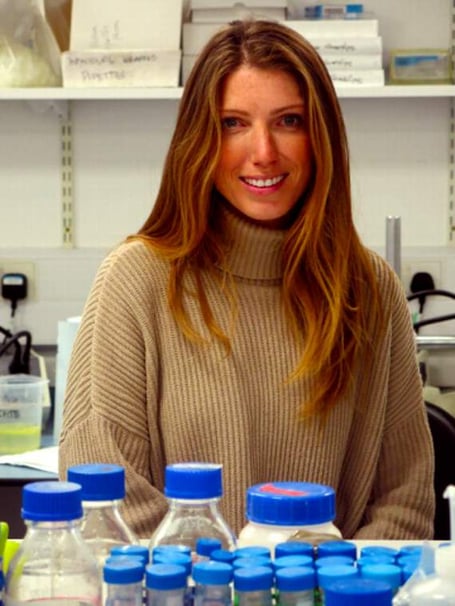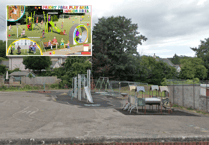A WOMAN who was diagnosed with a brain tumour a year after losing her husband to cancer visited a research centre where scientists are focused on finding a cure for the disease.
Freelance marketer Freyja Hanstein, 32, from Port Gaverne, was at the Brain Tumour Research Centre of Excellence at the University of Plymouth on Wednesday, November 13 to tour the lab where scientists are searching for a brain tumour cure.
The visit was inspired by Freyja’s own experience with brain cancer and marked the fifth anniversary of the death of her husband, Lars, to abdominal synovial sarcoma, a type of cancer.
Freyja was only 26 when Lars died in November 2014. Just 13 months later, the tables had turned and she herself was diagnosed with cancer — a grade 3 oligodendroglioma, in the area of the brain which controls memory and language. Her symptoms of light-headedness and balance issues were initially dismissed as grief.
She said: “Attending the lab tour was important to me as I want to help other patients. Through my own experience with cancer, losing Lars, and having studied biological sciences at university, I’m fascinated by medical research and I want to help raise awareness of brain tumours.
“Meeting Professor Oliver Hanemann and his team, who are researching low-grade brain tumours and the emerging area of personalised medicine, gave me a lot of hope going forward. It was an insightful day and I believe that patients and families should have access to such research and findings.”
Freyja has launched an app, Wholesome World, which promotes recipes, nutritional insights and inspiration for a healthy lifestyle. She added: “After my diagnosis in December 2015, I faced gruelling treatment which included surgery, radiotherapy and chemotherapy. Recovery was tough and I had to re-learn my parents’ names.
“As I went through treatment, I focused on eating ingredients which would be beneficial to me. I wanted to help other patients, their families and people who want to adopt a healthier way of living.
“I’m signed up to have scans every six months for the rest of my life. Fortunately, there has been no recurrence of the tumour and my most recent scan shows no sign of the disease.”
Mel Tiley, community fundraising manager at Brain Tumour Research, said: “We are very grateful to Freyja for sharing her story and helping to raise awareness of brain tumours — a disease which kills more children and adults under the age of 40 than any other cancer.
“Historically less than 1% of the national spend on cancer research has been allocated to this devastating disease. We cannot allow this desperate situation to continue.”
Brain Tumour Research funds sustainable research at dedicated centres in the UK, including its centre at the University of Plymouth. It also campaigns for the Government and the larger cancer charities to invest more in research into brain tumours in order to speed up new treatments for patients and, ultimately, to find a cure. The charity is calling for an annual spend of £35-million in order to improve survival rates and patient outcomes in line with other cancers such as breast cancer and leukaemia and is also campaigning for greater repurposing of drugs.
To donate to Brain Tumour Research, go to www.braintumourresearch.org/donation.





Comments
This article has no comments yet. Be the first to leave a comment.